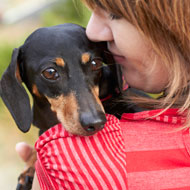Dogs aid breast cancer research

Breast carcinoma has long been known to share similarities in dogs and humans.
Scientists have discovered new similarities between mammary tumours in dogs and breast carcinomas in humans.
Using archived samples of mammary tumours from dogs, researchers at the University of Zurich found that some cells in the vicinity of the tumour behave in the same way as corresponding cells in humans.
In the development of tumours and the progression of carcinomas, both the characteristics of cancer cells and the cells surrounding the tumour are important. In humans, many tumours are able to reprogram healthy cells around the the tumour so that they support the growth of cancerous cells.
This mechanism plays a major role in human breast carcinoma, but until now it was not known whether this occurs in dogs; despite the fact that breast carcinoma has long been known to share similarities in dogs and humans.
When Zurich scientists analysed the surrounding tissue of canine mammary tumours they found that the healthy tissue around the tumour produced substances that promote the growth of tumours.
Enni Markkanen, of the University of Zurich’s Vetsuisse Faculty, explained: “Simply speaking, the tumour enslaves its environment: it forces the surrounding cells to work to its benefit.”
Researchers say this mechanism works in the same way in dogs and in humans, meaning tumour tissue from dogs is much better suited to research on breast carcinoma than tissue from rats on cells cultivated in the laboratory.
Markkanen added: “Importantly, however, we don’t view our dog patients as test subjects for cancer research. But they can help us to better understand breast carcinoma in both dogs and humans and fight it more effectively.”



 The veterinary mental health charity Vetlife is inviting the veterinary community to join it for a sponsored cold-water dip.
The veterinary mental health charity Vetlife is inviting the veterinary community to join it for a sponsored cold-water dip.